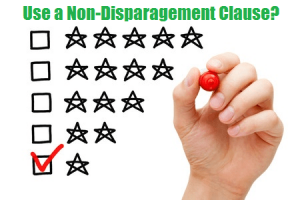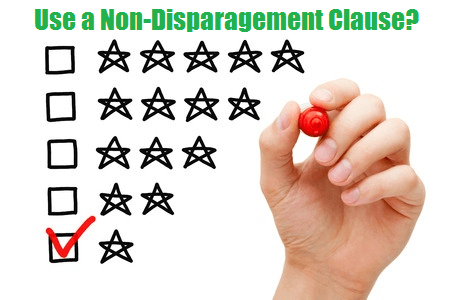
What is a non-disparagement clause?
A non-disparagement clause is an optional part of a contract that typically requires each party to the agreement will not say bad things about the others to third parties or the public in general. It’s designed to protect the reputations of all involved in the deal as well as prevent contractual disputes from going atomic through smear tactics.
Why have non-disparagement provisions become more important?
Traditionally, attorneys would focus on including nondisparagement clauses in settlement agreements that ended existing disputes before or during litigation. This is part of cleaning up a mess that’s already been made and trying to limit the damage caused in the process because the parties involved don’t like each other.
Today, because it’s so easy to ruin a company’s reputation through negative posts on consumer review websites and in social media outlets like Facebook, business owners are preemptively trying to gag their customers by having routine contracts provide for no disparagement.
Related Article: B2B Contracts – How To Avoid 4 Common Mistakes
Dallas Business Attorney Mike Young notes a recent Texas case where a couple was sued after posting a one-star review of a pet-sitting company on Yelp for violating a non disparagement clause. “The business was demanding up to $1 million to cover alleged damages from the negative review,” he said.
Are “no disparagement” clauses enforceable?
It depends.
There are conflicting opinions by courts in various jurisdictions on whether or not you can enforce such a clause against your customers.
Related Article: Does Your Business Lawyer Draft Contracts That Encourage Dispute Resolution Or Lawsuits?
As a general rule of thumb, a non-disparagement clause that’s between your company and another business (a B2B transaction) is more likely to be enforced by a court than such a clause between your business and individual(s) in a business-to-consumer (B2C) transaction.
When striking down “no disparagement” provisions in consumer agreements, employment agreements, and settlement agreements, judges tend to rely upon the First Amendment rights of the individuals or vagueness in the boilerplate to reach such a decision.
Should you include a non disparagement clause in your agreements even if it might be unenforceable?
Yes.
According to Dallas Business Lawyer Young, the primary purpose of the clause is to discourage the parties from discrediting each other in the first place rather than trying to obtain damages after disparagement has occurred. “If nothing else, the clause reminds everyone involved in a deal to be nice to each other.”

